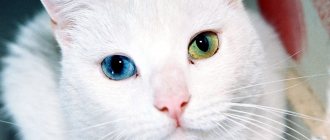8221Pavel
Cats, like dogs, have lived next to us for many centuries. These outwardly cute, proud and self-sufficient animals are endowed with special abilities - they clearly react to changes occurring in the external environment, and are excellent hunters and observers. The pet evaluates changes in a person’s mood, understands that he is ill or is experiencing emotional problems. Can cats sense their owner's pregnancy? Most owners of furry “roommates” answer this question only in the affirmative.
Why do cats react to pregnancy? To obtain an answer, several criteria must be considered :
- changes in a woman’s physical condition during pregnancy;
- instability of mood and changed emotionality, anxiety of the expectant mother;
- actions related to the purchase of children's things and arrangement of the apartment.
© shutterstock
Do cats feel their owners’ pregnancy and how exactly?
Did you know that our beloved felines are considered the most sensitive among pets. The opinion of many zoological scientists is confirmed by numerous studies of cats. They have well-developed feelings:
- vision;
- sense of smell;
- hearing;
- sensation of taste;
- touch;
- sense of balance;
- sense of temperature, time and place.
These amazing animals are endowed with nine senses. Therefore, it is absolutely clear that such an important event in the life of any woman as pregnancy does not go unnoticed by them even in the early stages.
It has always been believed that cats sense various changes in the human body, lie down on a sore spot, and take away the pain.
As with dogs, there is no scientific evidence that cats are sensitive to pregnancy, but these pets also often exhibit behavioral changes.
For example, a cat that has never come into your arms before may begin to come and lie on your stomach.
Indifference
The more common reaction of cats to the pregnancy of their owners is behavior without any changes. As a rule, they write about the extraordinary actions of animals and much less often talk about their ordinary habits. However, many cat owners note that their cats show no interest at all in the pregnancy of their owners. They lay down in the same places where they usually like to nap, and if it is the stomach or chest, then they receive no more attention than before. Most likely, this is the most natural reaction of animals, but owners talk about it much less often than about the unusual behavior of their pets.
However, can cat owners who show no behavioral changes feel pregnancy? At a minimum, they catch the smell, but perhaps the animal does not correlate it and other changes in its owners with pregnancy, or this phenomenon does not interest them.
How a cat can sense its owner's pregnancy
Is it true that a cat can feel its owner’s pregnancy before others find out about it? This is unlikely, this cannot happen! - those who have neither a cat nor a dog will answer. But most owners of four-legged friends will answer this question in the affirmative. Although no scientific experiments have been conducted and there is no evidence that pets can smell a woman’s pregnancy, you can find hundreds of messages on forums confirming this fact.
There are mothers who claim that their cats sensed pregnancy even before they saw 2 stripes on the test.
Girls, I had a similar incident at home. There are three kindred spirits living in our house, my husband, me and Kitty (our cat). So, as soon as I became pregnant and didn’t know it yet, Kitty began to lie on my tummy and purr. At first I thought that she was just basking, but now I mean that she knew in advance that the baby was there and told me about it.
My lady cat is capricious, she does everything on her own, she caresses when she wants or asks for food. And here, as soon as I lie down on the sofa, he immediately runs, purrs and climbs on top of me. I explained to her that she can’t lie on her stomach, she now lies on her chest or shoulder and purrs, and even so loudly. I just can't be happier when she lies like that.
And my cat constantly lays on his stomach, before he lay down at his full length, he is healthy and stretched out on me from chest to knees))) but now he curls up on his stomach as soon as I lie down or sit down. And so neatly, it used to plop down like a piece of meat, but now it lays down so carefully and purrs like a tractor) although I thought only cats were sensitive to the health of their owners, but it seems that cats are no worse either))
No matter how affectionate a cat may be, pregnant women should make a serious decision whether to leave it in the house or give it to someone for a while, because it is very difficult to predict the behavior of an animal, and besides, many talk about the danger - toxoplasmosis.
I have two cats at home. I know about toxoplasmosis. But something else surprises me. My Siamese literally won't let me lie still. I have a short period of time - it’s the sixth week. But she doesn't get off me. As soon as I lie down, he flies towards me, climbs onto my stomach, and does this with great caution, lies down and begins to purr tenderly. My husband is no less surprised than I am. Maybe she feels something?
I have a cat who is terribly wayward, not particularly affectionate, and in general it was not always possible to pet him. As soon as I became pregnant, he went crazy, while I’m at home he doesn’t leave my side, he constantly sleeps near my stomach or between my legs, without him I can’t go to the bath or to the toilet, he starts meowing loudly.
There are a lot of similar messages. But cats do not always react positively to their owner’s pregnancy. It happens that fluffies become aggressive, do not want to be handled and even hide from the owner.
And how they changed my cat! He used to purr, always meet me, spin around under my feet! And with the onset of pregnancy, he began to scare me ((My husband goes to work in the morning and the cat goes under the sofa, comes home from work in the evening and comes out... So my cat, on the contrary, avoids me ((
How does a cat manage to sense its owner's pregnancy? It turns out that cats carefully watch us, pick up changes in human behavior, mood, and perfectly understand body language.
The owner began to move more carefully, showed less activity and devoted less time to the fluffy beauty - a clear sign of impending changes. Here the cat is cuddling.
Whether or not to believe that a cat can feel its owner’s pregnancy is a purely personal matter. Everyone draws their own conclusions. For example, after reading messages on forums and talking with pregnant women whose cats prefer to spend their free time on their owner’s belly, I believed that they could feel pregnancy.
Let's consider how, with the help of its feelings, a cat is able to learn about a significant event in the life of every girl.
We suggest you read: How long does pregnancy in cats last and how does it go?
Smell is one of the most important means of obtaining information from a pet about the surrounding world. Home furnishings, people, everything is subject to careful study. Furry pets are especially sensitive to new smells of people, especially their owners. A woman carrying a fetus changes her hormonal levels, her body emits new aromas that are involuntarily detected by the cat.
The entire cat family has excellent vision at dusk and at night. Cats are even credited with distinguishing colors. Everyone knows how much pets love to watch TV. Late pregnancy significantly changes a woman’s figure, which does not go unnoticed by the pet.
The owners know that where there is no dog, the cat is the best guard. The slightest rustle causes a tense reaction. The cat always felt and understood your intonation and your mood well. When a woman is expecting a baby, she involuntarily changes her gait, moving smoothly and more slowly. Her character and behavior changes.
MOMENT
– Does a cat bleed during heat?
– No, cats usually don’t bleed. If you notice blood after a heat, it could be a miscarriage. You should see a doctor.
– How to reliably determine whether a cat is pregnant? Are there any special pregnancy tests for cats? - There are no special tests. The only reliable diagnostic method is ultrasound examination (ultrasound). It is carried out starting from the 30th day of pregnancy of the cat.
– Can a pregnant cat ask for a cat? – Usually no, this does not correspond to normal levels of hormones in the blood. If this is the case, then the cat has a pathology.
– How to distinguish a real pregnancy from a false one? – False pregnancy is a neuropsychic disease of an animal in which, after a certain period after estrus, usually two months, the animal begins to show signs of pregnancy: lactation, withdrawal, certain toys appear, which the animal nurses as its own offspring. This pathology is more common in dogs.
Sensation of temperature
Cats love warm, comfortable places in winter. They lie in a draft, cool, if it is a hot and stuffy summer. Your pet can feel the change in your body temperature during pregnancy, bask on your lap, or rub against your stomach.
Careful observation of changes in the behavior of your pet allows you to answer the question in the affirmative: do cats feel pregnancy? Ironically, they know this before the parents and the baby’s father. And the wonderful mystery of the birth of a new life is not a secret to them.
Overprotectiveness
Some owners say that as soon as they became pregnant, their cats do not leave them without their attention for a minute, constantly accompanying them around the apartment. And if the owner needs to go to the restroom or bathroom, then the pet remains at the closed door and meows continuously. What is it, caring for the owner and her offspring, or are cats so attracted to smells or other sensations that the animals are ready to follow them everywhere? And in this case, there will be no explanation, because it’s always like this with cats: there are more questions than answers.
Can cats sense a woman's pregnancy?
Cats, like dogs, have lived next to us for many centuries. These outwardly cute, proud and self-sufficient animals are endowed with special abilities - they clearly react to changes occurring in the external environment, and are excellent hunters and observers. The pet evaluates changes in a person’s mood, understands that he is ill or is experiencing emotional problems. Can cats sense their owner's pregnancy? Most owners of furry “roommates” answer this question only in the affirmative.
Why do cats react to pregnancy? To get an answer, you need to consider several criteria:
- changes in a woman’s physical condition during pregnancy;
- instability of mood and changed emotionality, anxiety of the expectant mother;
- actions related to the purchase of children's things and arrangement of the apartment.
A cat can feel its owner's pregnancy early, in the first months, weeks, even days after conception. Such insight is understandable, because special processes occur in a woman’s body, which are expressed by noticeable physiological changes:
- hormonal changes occur with signs of toxicosis - nausea, vomiting, reactions from the digestive system and intestines;
- body temperature rises slightly;
- the frequency of urination changes, the urine acquires a different smell;
- vaginal discharge becomes profuse.
Pets can't help but notice these bright signs. It is at such times that they become restless, try to accompany their owner, lie down next to her, and like to climb onto her stomach. They purr intensely and perform a “massage” with their paws.
The unborn baby is actively developing, while the woman’s belly is growing, inside of which a heartbeat can be heard and the activity of the fetus is felt. At the same time, the pregnant woman’s gait and movements become cautious and measured, her breathing quickens, and shortness of breath appears. Cats feel these metamorphoses. Animals have a developed natural curiosity; the pet watches what is happening with interest and accompanies the woman. Lie down next to him, listen, purr loudly and start rubbing his stomach - the favorite actions of most furry apartment dwellers.
Some cats negatively perceive the new state of their owner and regularly confirm their disagreement with her new situation with their actions - they show aggression, attack and hiss. Experts are inclined to explain this behavior by the animal’s fear of being expelled from its home, not being fed, as something incomprehensible is happening in the life of its owner.
Cats sense their owner's pregnancy for another reason. The period of waiting for a baby is a special psychological state accompanied by signs:
- increased emotionality;
- mood swings;
- frequent occurrence of anxiety;
- excessive vulnerability, tearfulness;
- a tendency to hysterics, sometimes to rage, and “loud” showdowns with others;
- a woman begins to think and feel in a new way.
A noticeable change in the owner’s usual behavior for the pet does not remain ignored on his part; he is able to feel that something wrong is happening. For some time the cat remains an outside observer, then carefully moves on to active actions. He begins to accompany his “ward” everywhere, gets under her feet, rubs against them.
Most cats correct emotional changes in a pregnant owner by lying on her stomach or next to it, calming the woman down with rhythmic, loud purring. Sound therapy is accompanied by repetitive movements - the cat rubs its muzzle against a part of the pregnant woman’s body, which is one of the methods of cat “psychotherapy”.
Firstly, if you have animals, they need to be checked by a veterinarian for parasites and given all the necessary vaccinations.
Next, for prevention, you need to regularly give them anti-worm medications.
If you feed your pet meat, it should not be raw or undercooked to again avoid infection with parasites.
You should use gloves to wash your animal's litter box. It’s even better to have a family member take on these responsibilities during your pregnancy.
Of course, you should always wash your hands after handling an animal.
You should not pet or touch animals outdoors.
Aggression, leaving home
Stories about how cats react to their owner's pregnancy are not so sweet. Thus, there are stories about the unambiguous jealousy of animals towards the future offspring of their owners. The pet strives to scratch or bite its stomach, while it may grumble and wag its tail. His actions do not resemble play; the animal is clearly unhappy or irritated. Pets rarely behave this way, but such cases do occur. The cat is afraid of something. Perhaps he was once picked up on the street, and he is afraid of losing his place in the house, food and the attention of his owners. Or the animal does not like strangers in the house, always has difficulty withstanding guests, and therefore shows hostility towards the upcoming addition to the family.
It also happens that shortly before the owner gives birth, the cat leaves the house and does not return. And this happens quite often, but where the animal can freely leave the home - in a private house or in a country house. Before this, the pet may not have shown any concern, nothing unusual happened in the family, and the owners paid no less attention to it than usual. And it remains a mystery why cats do this.
Can pets benefit their pregnant owner?
Animals can definitely benefit the expectant mother.
The purring of a cat, her sleeping in your arms and the opportunity to pet your pet can have a strong calming effect and lift your spirits, which is often necessary for expectant mothers.
Both cats and dogs have a very positive effect on the nervous system of the expectant mother. Of course, provided that she loves her pets.
In addition, for example, you need to walk your dog. And for the expectant mother, walks in the fresh air and physical activity are very important.
Cats are born hunters, and this cannot be taken away from them. They chase rolling toys, laser fire, sparrows and mice. Having brought another bird from the street to your door, he shares the spoils with you and thanks you for your boundless love. Don't forget to praise the furry animal for showing such incredible generosity. He needs this so much. Otherwise, the cat may be offended, and you will be left without “gifts” in the future.
Behavior of a cat during childbirth and signs of complications
During the entire birth, the cat must remain in the nest. If the pet is worried and tries to leave, it must be picked up and calmed down. While struggling, the cat may feel the urge to defecate and go to the litter box. You shouldn’t interfere, but watch carefully what happens next.
With this development of events, especially during the first birth, immediately after defecation, a bladder containing the first kitten emerges from the cat’s birth canal. If this happens, there is no need to panic, just pick up the cat and carefully carry it to the nest. The anus and fur under the tail can be gently cleaned using wet wipes.
Postpartum eclampsia is a common, insidious and very dangerous complication for which you need to prepare in advance. In rare cases, a cat experiencing eclampsia may kill or even eat its own kittens. Such a sight is difficult to endure even for an experienced animal owner, but you will have to pull yourself together to save the life of your pet.
All kittens that are born after this must be picked up immediately, mucus removed from the respiratory tract independently and placed in a separate nest with a heating pad. To save the cat, she needs to start taking calcium supplements and carry out maintenance therapy!
In very rare cases, a cat may kill her kittens if they are not viable. For example, with premature birth, premature kittens most often do not survive. However, for a healthy cat that does not suffer from a disorder of the central nervous system, it is more common to refuse to feed the offspring and completely ignore the kittens.
Buying a dowry for a baby, repairs
Cats sense a woman's pregnancy by her everyday behavior. Preparing for the birth of a child from the first days of his expectation involves actions that are noticeable to the cat. New things are bought and brought into the house - baby clothes, a crib, a stroller, cosmetics for the baby. All items are disinfected, washed, laundered and dried.
Cats experience particular anxiety when future parents begin renovations. The usual atmosphere in the house collapses, pungent odors, new objects, and prohibitions appear. Based on these signs, the animal feels that something new is expected, becomes observant, and pays increased attention to the owner.
A cat behaves in a special way next to a pregnant girl. This statement is true - the animals really feel the new state of the mistress.
Upon returning from the maternity hospital
The appearance of a baby in the house is stressful for any animal. This is due to the fact that life changes, smells and sounds unfamiliar to the cat arise. You can reduce this stress to a minimum in simple ways: • Periodically apply baby cream or lotion to the skin so that the animal has the opportunity to get used to this smell. • Don't let your cat sleep on your lap, but train her to rest quietly at your feet instead. • Do not allow the animal to enter the nursery before arriving from the hospital. • If the child will sleep with the parents, the bed must be purchased in advance so that the cat gets used to the new furniture. • When the baby begins to crawl, it is better to remove the cat's bowls away and feed the pet on time.
At first, the animal may behave inappropriately. To prevent this from happening, you need to give the cat the opportunity to sniff the baby, but not lick it. It is necessary to pet your pet upon returning from the hospital. You should not constantly drive the animal away from you, because... this will increase his jealousy. It’s better to let the cat watch your actions, and when the baby grows up, she will get along well with him.
Although science has not proven that pets sense the pregnancy of their owners, there are many examples of this! Dogs and cats can detect changes in mood, behavior, body shape and body chemistry that tell them about huge shifts taking place in a woman's body. There are other signals that are quite understandable to a dog or cat. They are great at reading body language and noticing when movements become more cautious. They're also great at picking up on any changes in your routine, such as the fact that you're not walking the dog as often, or sitting on the couch more, or that the rest of the family is being more caring towards you. Dogs, as a rule, become wary and begin to jealously protect their pregnant owner from the very beginning of pregnancy. Trainers who work with dogs report that they growl, bark, or block doors in front of the rest of the family - even the owner! - to prevent them from entering the room occupied by the expectant mother! Since cats participate less in the life of the family, they, in theory, should not change their behavior in this way. However, most stories agree that the cat protects the unborn child. One correspondent writes: “When I was pregnant, I often visited my friend, and her cats literally went crazy. They definitely lay around my stomach. Then my cat also began to make himself comfortable on it, until my daughter began to push him away from the inside!” There are a lot of similar messages. Another woman, Mrs Betheridge, says: “When I got pregnant, my cat began to act as if she was not a cat, but a small child! As a rule, she constantly lay on my stomach, and she started doing this even before I found out about the pregnancy.” Another woman says of her daughter: “When she first discovered she was pregnant, her cat kept trying to sit on her belly or snuggle next to her... They definitely feel it.” And sometimes cats sense pregnancy even before their owners find out about it. Here's what Ellen Lawrence writes: “My cats somehow knew I was pregnant before I knew it myself! Every time I sat down or lay down, they instantly appeared on my stomach or next to me! They had never done this before and I couldn't figure out what was wrong until I looked at the test results! They continued to behave the same way for nine months and returned to their previous habits immediately after I gave birth!” Unfortunately, some cats become jealous and feel neglected under these circumstances. They become more aggressive or start pooping in places they shouldn't, such as the bed or laundry basket. Miranda Green writes: “We had to get rid of the cat because he sensed that I was pregnant. Within four months his behavior had completely changed, he started scratching me whenever he was near my tummy... For some reason he just hated it! He bit him, scratched him... But only his stomach! The cat clearly felt what it was like and did not want another child to appear in the house, relegating him to second place!”
Is it true that dogs sense their owner's pregnancy?
There is no scientific evidence that dogs sense their owner's pregnancy. But these pets are definitely aware that changes are happening to the woman, and they react to this quite differently.
There are a huge number of cases where a dog’s behavior changed along with the onset of a woman’s pregnancy.
Some dogs begin to intensely protect their pregnant owner: they growl at anyone who approaches her or tries to touch her belly, or, on the contrary, they move away from the woman.
In many ways, the animal’s reaction depends on the owner; if she begins to constantly drive the dog away from her, then the pet may feel unnecessary and offended.
Cats can express their love through playing with their owner. At a young age, kittens play for so long that they never seem to get tired. They can scratch, bite and get real pleasure from it. The family member who receives more attention is usually the animal’s favorite.
Sometimes this cat habit seems ridiculous to us. Why did the cat raise its tail again and poke its butt in the owner’s face? The answer is simple. This is how she shows you her trust and affection, and also greets you. Know that she will not perform this ritual with the “first person she meets.” You are among the chosen ones. This habit also takes its roots from cat childhood, when kittens thus greeted their mother returning from the hunt.
Can a pregnant cat ask to be with a cat?
Only after the first mating does the cat’s brain begin to produce the hormone responsible for ovulation.
The level of this hormone must reach the proper concentration necessary for the maturation of the egg. This can also happen on the 3rd day of mating.
The process of ovulation in a cat begins only after mating, and sperm fertilize the mature egg after two and a half days. And only after conception the ovaries begin to produce progesterone. This hormone is responsible for pregnancy in mammals. It stops estrus, and therefore the urge to mate, strengthens the uterus and helps the fertilized egg take root in it.
Therefore, immediately after mating, which seems to have been successful, the cat does not realize that she is pregnant, because progesterone has not yet begun to be produced, and may ask to see the cat.
As hormone production begins, the cat calms down.
Insidious progesterone
You can recognize a “good” pregnancy by looking at your belly. But how can you tell if a cat is pregnant if she wants a cat?
Most veterinarians are categorical: a pregnant cat cannot be attracted to a male cat. If she shows signs of desire, then she is not pregnant. Or this is a false pregnancy, which can occur as a result of mating with an infertile or castrated cat.
From the mating process itself, a hormone responsible for the maturation of the egg begins to be produced, which, in turn, stimulates the production of progesterone, which is responsible for pregnancy. Then a new estrus will begin after the progesterone level drops, after 5-7 weeks.
Why, with such a clear answer from veterinarians, does the question of a pregnant cat’s desire to have a cat increasingly arise among pet owners? Progesterone is again to blame.
When the hormone level is reduced, i.e. pathological hormonal imbalance, from the third to the sixth week the cat may come into heat again. And she starts asking to see the cats. The fact is that the cat’s body does not realize the pregnancy, and the kitty begins to demand completion of the work it has started.
Superfetation and pregnancy
If you allow a cat to be with a cat, she can become pregnant again, without harming the existing embryos. This phenomenon is called superfetation.
Several litters of a cat
A rather rare phenomenon in the past, it now occurs once in 10 cats. Both broods develop normally in the uterus, but with an interval of 3-6 weeks.
In this case, the cat either gives birth to the older litter healthy, and the younger one is pushed out prematurely and dies. Or, which is rare, the first one gives birth, carries the second to term and gives birth too. The problem of nutrition immediately arises, since the mother does not have enough nipples or milk.
If the cat is domestic and under control, then it is not in danger of superfetation. But, if the cat has free access to cats, and the owners did not notice the first pregnancy, then anything is possible.
Is it true that dogs sense their owner's pregnancy?
Is it true that cats and dogs sense their owner’s pregnancy? Most pet owners can confidently say “yes!” And although there is no scientific evidence to support this theory, many women claim that their pet sensed pregnancy before they themselves knew or suspected it.
Research suggests that some dogs, for example, can smell cancer, so it is possible that they can also smell the changes in a woman's body that occur during pregnancy.
We all know that animals have a much sharper sense of smell than humans. Animals can remember a person by his smell.
While carrying a baby, the expectant mother undergoes many changes in her body. Also, against the background of hormonal changes, a woman’s scent may also change, but only her pet will be able to smell it.
In addition, the animal may notice changes in your behavior. For example, you will start going to bed earlier, stop going to work, your gait may change, new habits will appear, etc.
The pet will also notice external changes over time.
Preparing for childbirth
1–2 weeks before giving birth, the cat will begin what is called nesting. Usually, from the 7th week of pregnancy, the pet begins to look for a convenient shelf in the closet or other shelter that will become a nest. During this period, it is strictly forbidden to let the cat go for walks, as it may set up a nest outside the house.
Carefully monitor your pet's behavior and do not interfere unless absolutely necessary. If your cat decides to build a nest in your closet, it is wiser to empty the shelf for her than to move the nest to a more convenient place for you. It is necessary to pay attention to the preparation of the nest, if only because the cat can give birth on your bed, clothes or a stack of clean laundry.
You can avoid negative consequences if you prepare the nest for birth yourself. Stores sell special boxes that are equipped with nests for women in labor. In fact, any sturdy cardboard box with high sides will do.
One wall is cut off, leaving a side that the cat can easily step over. When preparing the nest, it is better to stock up on an extra box, since during birth the cardboard may get wet and tear.
Think in advance about how to close the top of the box so that the cat feels private and calm. A few days before giving birth and the onset of contractions, most cats become withdrawn and try to hide. For an expectant mother who will give birth for the first time, it is better to equip several nests at once.
It’s worth taking care of the bedding in advance. Absorbent diapers are best because they are easy to change. After the kittens are born, the litter must be changed daily. Make sure you have replacement bedding made from natural material.
He sleeps on your lap
It's no secret that cats sleep a lot. Scientists have calculated that they can spend up to 16 hours sleeping every day. At the same time, they feel the most vulnerable and defenseless, so they choose only the safest place to relax. Well, if the cat lay down on your lap and fell asleep sweetly, this means that she feels completely safe next to her owner.










